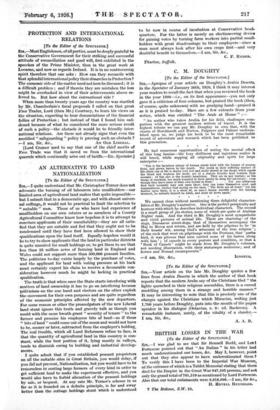C. M. DOUGHTY
[To the Editor of the SPECTATOR.] SIR,ŌĆöApropos of your article on Doughty's Arabia Deserts, in the Spectator of January 30th, 1926, I think it may interest your readers to recall the fact that when you reviewed the book in the year 1888ŌĆöi.e., on its first appearanceŌĆöyou not only gave it a criticism of four columns, but praised the book (then, of course, quite unknown) with no grudging handŌĆöpraised it as it is praised to-day. Here are a few extracts from your notice, which was entitled " The Arab at Home " :- " An author who takes Arabia for his field, challenges com. n with the greatest modern writers of travel. It is the ighest tribute we can pay Mr. Doughty to own that, with the charm of Burckhardt and Burton, Paigrave and Palmer undimin- ished upon us, we judge his book to be the most remarkable record of adventure and research which has been published to this generation.
He had numerous opportunities of noting the mental effect of this long famineŌĆöthe foxy shiftiness and ingenious malice it will breed, while sapping all originality and spirit for large enterprise :ŌĆö
ŌĆó This is the incurious misery of human minds faint with the hunger of genera. Cons, and grown barren in the desert. The Arabs in their suffering manner of life (their cup of life is drawn very low and easily stirred at the dregs) which angers the blood and weakens the heart, are of a jealous frenetic heat towards their enemies : of this also is the Semitic fanaticism. They are in any warfare, as the wasps of mankind, too much. tempted in their nature to sting the adversary : even though they leave some of their own bowels in them.' . . . For any endeavour that their necessity may cast upon them, they can rouse themselves erect and magnanimous, whence that saying on the oasis, ' The Bedu are all heart," but the famine upon them, It is a short fit, as man's brains unsettle over the fainting stomach, he submits himself to Allah, and must sit down again.'
We cannot close without mentioning three delightful character- istics of Mr. Doughty's narrative. One is the perfect perspicuity and humour with *which he describes individual characters. The second is a small group of jin stories, some of which are quite of Arabian Nights' rank. And the third is Mr. Doughty's most sympathetic and vivid pictures of animal life. These are charmingŌĆöof the dogs, Damascus street-dogs, that of themselves accompany the Haj to Mecca and return, and are held by the pilgrims to be ' in their beasts' wit, among God's witnesses of the true religion ' ; of the cock that went on pilgrimage with the Persians, that ' pasha bird, it was piteous that men carried none of his harem along with him' ; of camels in every posture and condition, so that a Book of Camels ' might be made from Mr. Doughty's volumes, not needing illustration, with their statuesque sentences ; and of horses and Nomad encampments."


























































 Previous page
Previous page